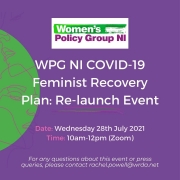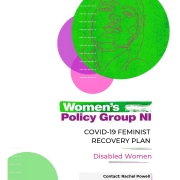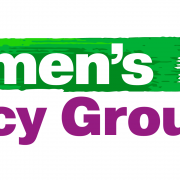This is an excerpt from WRDA Briefing on TEO Engagement with the Women’s Sector and the TEO Covid-19 Recovery Plan
The NI Women’s Policy Group (WPG) published their original COVID-19 Feminist Recovery Plan in July 2020 and relaunched the Plan in July 2021 with updated evidence and recommendations. Both Plans outline the disproportionate impact of the pandemic on women and provide a roadmap for how to address this impact by making several policy and legislative recommendations.
In August 2021, The Executive Office (TEO) published its own COVID-19 Recovery Plan, with the aim to “accelerate economic, health and societal recovery in the short term so we can emerge stronger and also to plan now for longer term transformative and innovative change.” Despite being aware of the WPG Feminist Recovery Plan since July 2020 and the recommendations made in this document, significant gaps remain in TEO’s Recovery Plan, in terms of addressing the disproportionate impact of the pandemic on women.
Minimal engagement has taken place between TEO and the women’s sector in the development of TEO’s Recovery Plan. This is despite the fact that the WPG have produced two Recovery Plans since the start of the pandemic and have conducted primary research on the impact of the pandemic on women in Northern Ireland. Furthermore, engagement requests from TEO have not been meaningful and, in several cases, have provided women’s sector organisations with extremely short timeframes to submit responses.
In recent years, there has been an increasing tendency by TEO to rely on the willingness of the sector to respond to consultations within unreasonable periods of time. The expectation by TEO that the women’s sector, a sector already facing severe resource constraints, respond to consultations within the space of a few days is completely unacceptable. This short timeframe does not provide the sector with the opportunity for meaningful engagement.
Women’s sector organisations, collectively represented by the WPG, have significant expertise and experience in understanding the issues faced by women in Northern Ireland, as evidenced in the Women’s Policy Group COVID-19 Feminist Recovery Plan. Public officials have much to gain from utilising this expertise and experience when drafting public policy and legislation, and can do so by providing adequate timeframes for women’s sector organisations to meaningfully respond.
Women in Northern Ireland have been disproportionately impacted by the COVID-19 pandemic; financially, socially and in terms of health. It is crucial that legislative processes on issues relating to women are accessible and open, as women’s lived experience is crucial to tackling the disproportionate impact of the pandemic on women.
This briefing will primarily focus on the limited and unsatisfactory nature of TEO engagement with the women’s sector when developing the TEO COVID-19 Recovery Plan.
This is an excerpt from WRDA Briefing on TEO Engagement with the Women’s Sector and the TEO Covid-19 Recovery Plan









